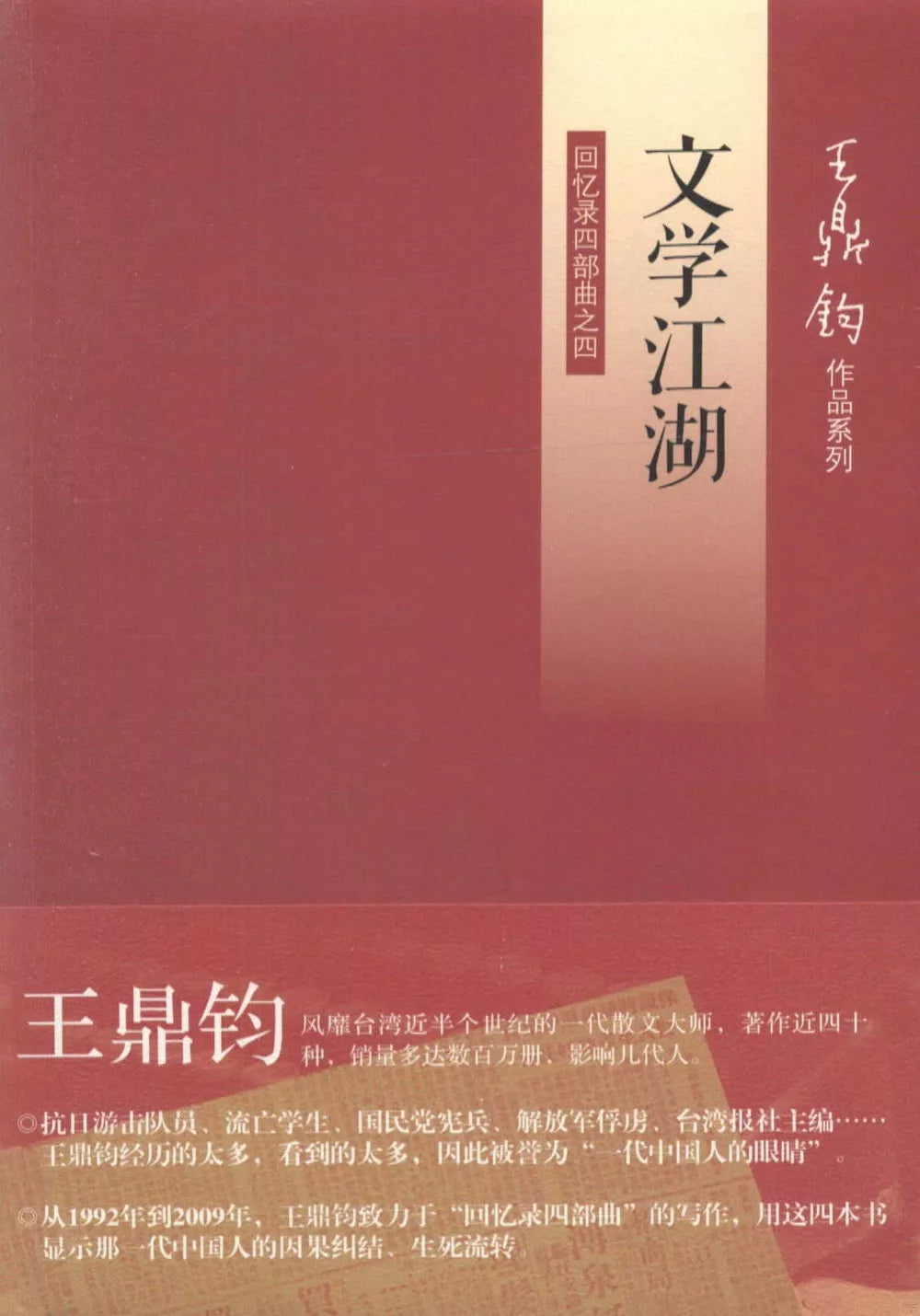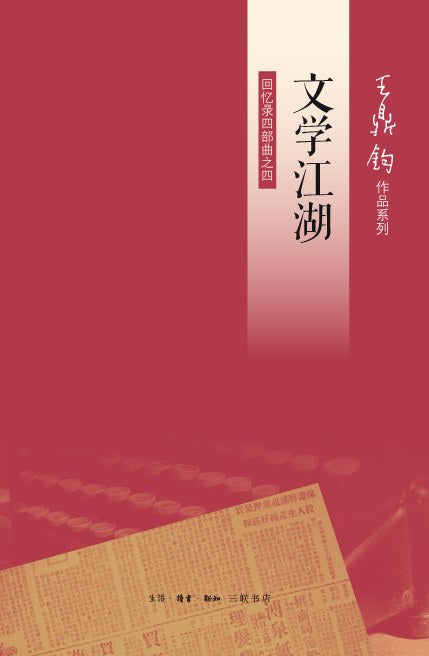1
/
of
2
Literary World
Literary World
Wang Dingjun
Regular price
$14.99 USD
Regular price
Sale price
$14.99 USD
Unit price
/
per
Out of stock
Couldn't load pickup availability
About Book
About Book
This is the fourth volume in Wang Dingjun's "Memoir Quartet." From his retreat to Taiwan with the Kuomintang army in 1949 to his immigration to the United States in 1978, the author uses three decades to personally experience and record Taiwan's grand history and its own personal joys and sorrows. His personal experience of the "literary world" epitomizes Taiwan's turbulent thirty years: from the embarrassment and confusion of the early 1950s, to the humiliation and panic of the White Terror, to the "psychological exhaustion" of the Cold War, and finally Taiwan's economic takeoff...
"When I write my memoirs, I'm not writing about myself. I'm using myself to write about the visibility I had back then. My writing method is to use myself as the center and extend the radius to draw a circle. People are in the world, times change, and situations change. After I finish one "circle", I will draw another. The entire memoir is made up of many "circles" strung together."
The fourth volume of Wang Dingjun's "Memoirs in a Quartet" describes the bizarre intertwining world of literature, politics, and espionage in Taiwan from the 1950s to the 1970s. The author's unique experience allowed him to observe and understand the real concerns and specific concerns of those implementing literary and artistic policies at the time, while also providing an outsider's perspective on the conflicts and tensions arising from the interplay of various forces. This strange yet realistic period of literary history is vividly captured in the book. The "literary world" the author personally experienced also epitomizes Taiwan's turbulent three decades: from the embarrassment and confusion of the early 1950s, to the humiliation and panic of the White Terror, to the "psychological exhaustion" of the Cold War, and finally the forced decision to settle down when Taiwan's economic takeoff and ambitions of "rebounding the mainland" became a laughingstock...
Wang Dingjun possesses a dual identity as both an insider and an outsider. He can observe and understand the real concerns and specific troubles of these implementers of literary and artistic policies from within, and he can also gain insight into the contradictions and tensions caused by the interweaving of various forces from the outside. Only by providing both insider and outsider perspectives at the same time can this strange but realistic literary and artistic history have a chance to be clearly revealed.
Yang Zhao's "Literary Jianghu" not only bears witness to history but also offers enlightenment and lessons, allowing us to understand the suffering, dreams, and hopes of an ordinary Chinese person during the past 20th century. ... This book offers a glimpse into the evolution of worldly affairs, human sentiments, and the trends of the times over the past thirty years, as well as the author's independent reflections on the fate of the nation and the lessons of history. It is a personal summary of immense historical and humanistic value.
——Introduction to the Gao Hua Series: Using a lifetime of waiting for freedom to describe the karmic entanglements and the cycle of life and death of Chinese people in the 20th century. Qi Bangyuan, Zhu Xining, Yang Zhao, Gao Hua, and Wang Qisheng recommend Wang Dingjun's four-part memoir:
Yesterday's Clouds, Angry Boy, Mountain Pass, and Literary Jianghu
"During the War of Resistance Against Japanese Aggression, I lived in Japanese-occupied areas and also in the rear areas of the war effort. During the Civil War, I served in the Nationalist Army and witnessed both the KMT at its peak and the Communist Party's complete victory. I was a prisoner and served in liberated areas. During the War of Resistance Against Japanese Aggression, I received the KMT's wartime education and was baptized by authoritarian ideology. Later, in Taiwan, swept by the tide of the times, I was reconstructed by the ideas of democracy and freedom. I have experienced great hardships and great heat, profound destruction and reconstruction... My experience is complete. I believe that God has kept me until now so that I can bear witness."
The War of Resistance Against Japanese Aggression, exile, civil war, white terror... the world was in chaos at that time, but these four memoirs have a clear thread, showing the turbulent times like the Flaming Mountain through personal experiences of separation and chaos. It reads like a chapter novel, with wonderful stories connected one to another - this is actually what the octogenarian author has earned with his youth and blood and tears!
What's remarkable is that the author doesn't write this memoir as a tearful indictment of his own blood. Instead, he uses his own experiences, thoughts, actions, and knowledge, employing the pursuit of beauty in literature, truth in history, and the search for understanding in philosophy to transform these tears into a pearl, presenting the existence of a generation and attempting to awaken modern attention to and understanding of the most important collective experiences of the Chinese people of that era. Without sensationalism or outcry, the work is calm and composed, yet it possesses an epic grandeur and soul-touching power.
"Fighting Through the Mountains and Rivers" won the United Daily News Readers' 2005 Best Book Award, "The Memoirs Quartet" was named one of the China Times' 2009 Top Ten Books, and "Literary Jianghu" won the Grand Prize at the 3rd 2010 Taipei International Book Fair.
"When I write my memoirs, I'm not writing about myself. I'm using myself to write about the visibility I had back then. My writing method is to use myself as the center and extend the radius to draw a circle. People are in the world, times change, and situations change. After I finish one "circle", I will draw another. The entire memoir is made up of many "circles" strung together."
The fourth volume of Wang Dingjun's "Memoirs in a Quartet" describes the bizarre intertwining world of literature, politics, and espionage in Taiwan from the 1950s to the 1970s. The author's unique experience allowed him to observe and understand the real concerns and specific concerns of those implementing literary and artistic policies at the time, while also providing an outsider's perspective on the conflicts and tensions arising from the interplay of various forces. This strange yet realistic period of literary history is vividly captured in the book. The "literary world" the author personally experienced also epitomizes Taiwan's turbulent three decades: from the embarrassment and confusion of the early 1950s, to the humiliation and panic of the White Terror, to the "psychological exhaustion" of the Cold War, and finally the forced decision to settle down when Taiwan's economic takeoff and ambitions of "rebounding the mainland" became a laughingstock...
Wang Dingjun possesses a dual identity as both an insider and an outsider. He can observe and understand the real concerns and specific troubles of these implementers of literary and artistic policies from within, and he can also gain insight into the contradictions and tensions caused by the interweaving of various forces from the outside. Only by providing both insider and outsider perspectives at the same time can this strange but realistic literary and artistic history have a chance to be clearly revealed.
Yang Zhao's "Literary Jianghu" not only bears witness to history but also offers enlightenment and lessons, allowing us to understand the suffering, dreams, and hopes of an ordinary Chinese person during the past 20th century. ... This book offers a glimpse into the evolution of worldly affairs, human sentiments, and the trends of the times over the past thirty years, as well as the author's independent reflections on the fate of the nation and the lessons of history. It is a personal summary of immense historical and humanistic value.
——Introduction to the Gao Hua Series: Using a lifetime of waiting for freedom to describe the karmic entanglements and the cycle of life and death of Chinese people in the 20th century. Qi Bangyuan, Zhu Xining, Yang Zhao, Gao Hua, and Wang Qisheng recommend Wang Dingjun's four-part memoir:
Yesterday's Clouds, Angry Boy, Mountain Pass, and Literary Jianghu
"During the War of Resistance Against Japanese Aggression, I lived in Japanese-occupied areas and also in the rear areas of the war effort. During the Civil War, I served in the Nationalist Army and witnessed both the KMT at its peak and the Communist Party's complete victory. I was a prisoner and served in liberated areas. During the War of Resistance Against Japanese Aggression, I received the KMT's wartime education and was baptized by authoritarian ideology. Later, in Taiwan, swept by the tide of the times, I was reconstructed by the ideas of democracy and freedom. I have experienced great hardships and great heat, profound destruction and reconstruction... My experience is complete. I believe that God has kept me until now so that I can bear witness."
The War of Resistance Against Japanese Aggression, exile, civil war, white terror... the world was in chaos at that time, but these four memoirs have a clear thread, showing the turbulent times like the Flaming Mountain through personal experiences of separation and chaos. It reads like a chapter novel, with wonderful stories connected one to another - this is actually what the octogenarian author has earned with his youth and blood and tears!
What's remarkable is that the author doesn't write this memoir as a tearful indictment of his own blood. Instead, he uses his own experiences, thoughts, actions, and knowledge, employing the pursuit of beauty in literature, truth in history, and the search for understanding in philosophy to transform these tears into a pearl, presenting the existence of a generation and attempting to awaken modern attention to and understanding of the most important collective experiences of the Chinese people of that era. Without sensationalism or outcry, the work is calm and composed, yet it possesses an epic grandeur and soul-touching power.
"Fighting Through the Mountains and Rivers" won the United Daily News Readers' 2005 Best Book Award, "The Memoirs Quartet" was named one of the China Times' 2009 Top Ten Books, and "Literary Jianghu" won the Grand Prize at the 3rd 2010 Taipei International Book Fair.
Publication Date
Publication Date
2013-01-01
Publisher
Publisher
生活·读书·新知三联书店
Imprint
Imprint
Pages
Pages
354
ISBN
ISBN
9787108042194
share



